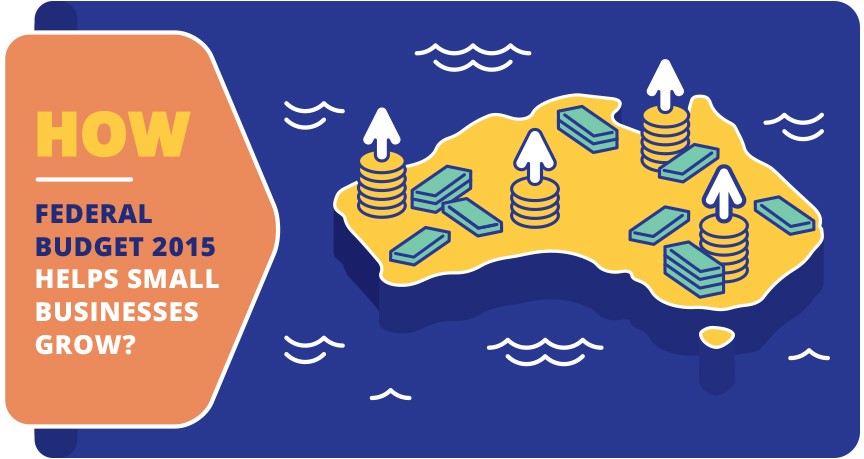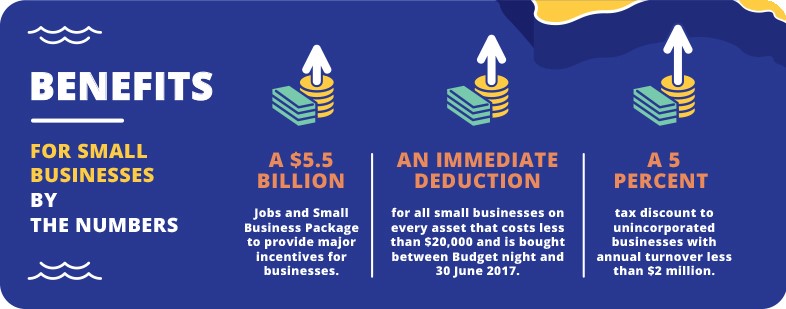
How Federal Budget 2015 Helps Small Businesses Grow
For more than 2 million small businesses in Australia, recent updates to the federal budget brought a range of new growth opportunities. Through the plan named “the biggest small business package in the nation’s history,” small and startup companies will receive budget support and growth incentives necessary for accelerated development.
The boost comes in the form of a $5.5 billion worth package called Growing Jobs and Small Business, which aims to empower small businesses for further growth and innovation. The Australian Government itself claims that this is a historical step intended to help small businesses “invest more, grow more, and employ more.”
The benefits provided will enable Australian entrepreneurs with a viable business idea to start a company with fewer investments than ever before. This way, small business will become an area more vital to the Australian economy.
The current state of the Australian economy
According to the figures provided by the Government, the national economy has been constantly developing over the past few years. In the last two years only, over 280,000 new businesses were established, while the number of newly created jobs exceeds a quarter of a million.
Such a consistent growth over the last few years was partly enabled through recent Free Trade Agreements with Japan, Korea and China, which created a range of new opportunities for Australian businesses. Now, the government believes it’s the right time to further invest in small business and stabilize this area. With the new package, the Government aims to help them “become profitable, sustainable and competitive,”in order to ensure they are “in the best position to hire new employees, providing more jobs, including for Australia’s youth and older workers.”
Now, let’s see what’s in it for your company.
Summary of benefits
The new plan represents a strategic initiative that focuses on several key areas that make major differences in the way a small business is established and developed. The greatest benefits of the plan include significant tax discounts for both incorporated and unincorporated businesses, as well as accelerated depreciation for items that cost less than $20,000.

Other than small business incentives, the new budget also introduces various benefits for parents and youth. For example, families with an income less than $65,000 will be paying 85% less for their childcare fees, while the youth will gain new employment opportunities through Australia’s $330 million Youth Employment Strategy.
Still, small businesses remain the biggest winners in the plan since they are increasingly critical for ensuring a stable future of the country. Below is the breakdown of the most important benefits designed for them.
- Tax cuts
One of the most important changes is the significant tax rate reduction for companies with an annual turnover under $2 million. These reductions are primarily intended to boost small businesses’ cash flow and enable the owners to focus on innovation and quality of their operations. The discounts will be different for incorporated and unincorporated businesses, whereupon unincorporated businesses that constitute the largest portion of Australian small businesses will have higher tax discounts.
– Incorporated businesses: 1.5% tax rate discount
– Unincorporated companies (sole traders): 5% tax rate discount
The plan came into effect from July 1st and will be valid through June 2017. This means that the following two years will be the right time for business owners to start working on their ideas and contribute to the development of the small business ecosystem as a whole.
- Increased depreciation threshold
In addition to helping new ideas come to life, the new package also supports innovation in existing small companies. With immediate discounts for assets that cost less than $20,000, the government aims to encourage innovation across multiple sectors.
During the first income year, the government will depreciate assets that cost less than $20,000 at 15%, while the second income year will bring a 30% deduction.
The primary idea behind this initiative is to enable small businesses to continue investing in the areas that matter most for their operations. This way, they will be able to replace outdated machines or otherwise important business equipment and improve their productivity, as well as cash flow.
- Cutting red tape
Red tape cuts come as another measure to remove impediments for small business growth. So far, small businesses have experienced proportionally larger legal burden, which will be minimized through red tape reduction within the Fringe Benefits Tax (FBT). This will additionally help small businesses stay connected with the digital economy through the FBT exemption for work-related portable electronic devices.
Startups and entrepreneurs
As another vital segment of the economy of Australia, startups and entrepreneurs will also be incentivized with the new budget plan.
This will be mostly achieved through immediate deduction for professional expenses including company incorporation services, which is supposed to encourage more entrepreneurs to start developing their projects. In addition to this, the government intends to streamline the process of company registration by building a new website that will simplify the critical processes.
This is particularly important given the rise in the tech startup field, which is now a global force of innovation. The new plan will, therefore, also enable Australia to become more competitive in this field.
Public reactions
When it comes to public reactions regarding the new plan, mostly positive thoughts could be heard in the national media. Although most small businesses welcomed the new plan, however, some analysts criticized it as being overly ambitious.
One of the areas that seem to lack additional incentives is the startup ecosystem. In an interview for Business Insider, multiple CEO’s of Australian startups regarded the new budget as positive. Still, there are those who pointed out to some of its downsides. Kyri Theos, Country Manager Australia at Upwork believes that the tech startup scene could be further supported:
“However the budget does not appear to emphasize building our technology skills base. This is concerning given that we are ranked 73rd in science and engineering graduates, behind Uzbekistan and Myanmar.”
Similarly, an article on The Conversationargues that the new budget won’t contribute to the development of science in any way. The major point of criticism is the fact that Australia remains one of the two OECD countries without the plan for a strategic growth of its scientific enterprise.
This could definitely be regarded as one of the major downsides of the new plan and is definitely a space for improvements. Overall, however, the plan promises major economic improvements and could be classified among the best crafted ones in the last few years.
